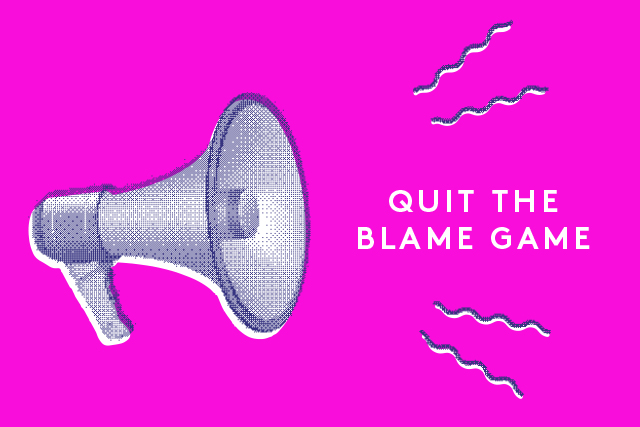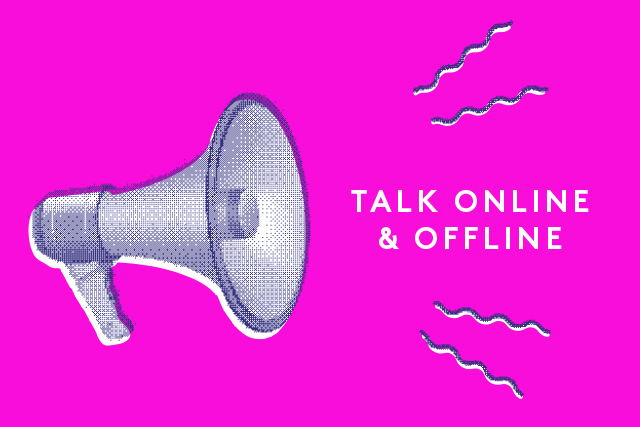I grew up in a pretty blunt household — we said what was on our minds and no topic was off-limits. This level of candor meant no silent treatments, no hiding behind slammed doors, and no letting things stew. While honesty has certainly helped me in personal relationships as well at the office, there are times when my dose of truth serum can be a little too potent. Why does talking (something most of us have been doing since infancy) become so difficult sometimes?
“Communication is, above all, a skill — and very few people know how to communicate effectively, naturally. It takes thoughtfulness and a lot of practice,” says Carl Alasko, PhD, a California-based psychotherapist and author of Say This Not That: A Foolproof Guide to Effective Intrapersonal Communication.
This basically means you need to strategize and practice if you’re going to successfully confront your roommate about her less-than-stellar cleanliness skills (or tell a coworker he isn’t pulling his weight on a project). No worries if your eloquence isn’t quite Brian Williams-level; we’ve tapped top communication experts for their tricks. Get ready to master the art of conversation.
This article originally appeared on Refinery29.com.
Get to the Point

Being honest with someone can be intimidating. I’ve seen “moments of truth” that go brutally wrong and end up featuring tears, accusations, and flying iPhones. But, you shouldn’t avoid confrontation like it’s a bad Nicolas Cage movie; there are instances when it’s necessary to be up-front.
“Be straightforward with people when the complaint is one that directly affects your relationship,” says Art Markman, PhD, professor of psychology at the University of Texas. “Beating around the bush runs the risk that they will not understand the message.” The best way to approach a confrontation is to decide in advance what you what to accomplish, explains Dr. Alasko. If you need to call out a close friend for consistently ragging on you, say: “You have been really critical of me lately. I want you to stop.” “You don’t want to play victim and pretend nothing is wrong,” Dr. Alasko explains. Prep beforehand, recalling concrete examples of when you felt upset so you can remain factual.
At work, be extra-attentive about making sure the point is open for discussion. Since there are more boundaries at play in the office, it’s good to say something like “Would it be okay for me to offer a suggestion?” or “I’d like to provide an explanation and discuss this further.” Whether you are delivering a performance review or proposing a change to a co-worker, you’ll convey a neutral position and open the floor up to dialogue.
In any scenario, it’s important to realize that anything you bring up can come as a surprise to someone. “I always remind my clients: Just because you’ve known someone for a long time, [it] doesn’t mean you can read each other’s minds…sometimes people don’t realize that they are doing something wrong,” explains Anna Ranieri, PhD, a California-based counselor and co-author of How Can I Help?
(MORE: 10 Things Not to Say at Work)
Quit the Blame Game

Being direct doesn’t have to be hurtful. Dr. Alasko urges us to avoid the four toxic behaviors: criticism, accusation, punishment, and humiliation. “These will only create anger and distrust, and push people further away,” he says. When the person you’re speaking to doesn’t feel attacked, he or she will be more open to discussion, and more willing to initiate change.
An easy way to eliminate criticism is to use strict facts to get your point across, says Joseph Grenny, co-author of Crucial Conversations. Instead of stating, “You were late again,” aim to be more neutral and say, “You agreed to be here by 2 p.m., but you arrived at 2:20.” “By describing the gap between what was expected and what happened, you remain judgment-free,” he says. Being able to phrase the truth in a compassionate manner makes it much easier for someone to view your comments appreciatively instead of defensively.
For your message and guidance to be well-received, it’s also important to take timing into account; a study in the Journal of Applied Psychology found that people are less likely to take advice when they are feeling upset or angered by previous events.
(MORE: The Genius Guide to FAKE Confidence)
Don’t Be a Know-It-All

I’ll admit it: I love to play therapist. But, as much as I’m thrilled to offer any insightful pearls of wisdom, I’ve learned to dish them out cautiously; it turns out, not everyone wants advice. “Sometimes, people just want to vent,” says Dr. Ranieri. When you are confronted with a tale of despair, go ahead and ask: “Hey, did you want my advice? Or are you just looking to get this off your chest?”
If your opinions are solicited, keep this in mind: Researchers found that people respond more readily to information rather than votes for or against something. So, cushion your recommendation with facts about what may or may not have worked well in the past.
On the other side of the spectrum, there are the chronic advice-seekers. You may spend hours counseling these individuals, but they never, ever seem to follow what you propose. In these cases, “It’s okay to be blunt and say ‘You’ve asked me for advice several times already, but I’m not sure we’re getting anywhere,'” says Dr. Ranieri. “Being up-front can help jolt a self-realization that maybe it’s time to take action.”
(MORE: Are You Being Lied to? 10 Tell-Tale Signs)
Talk Online & Offline

Gchat, email, and texting can be saviors when we want to communicate at lightning speed — or avoid dealing with someone face-to-face. “Email is an especially good way of bringing up news to introverts, who may need some time to absorb the information, reflect, and prepare a response,” Dr. Ranieri explains.
But, you don’t want online communication to become your default. It’s a “passive way of handling problems,” Dr. Ranieri cautions. If you have a big announcement to make to a boss or partner, go ahead and bring up the issue via email — but ask to follow up with an in-person discussion. Your smartphone is not the appropriate channel for breaking up, quitting your job, or bringing up any concern that will take multiple messages to negotiate. “You’ll want visual contact so you can determine if the other person is on the same page,” explains Grenny. A study in the Journal of Information Systems Research found that face-to-face discussion reduces misunderstandings because it allows for immediate feedback and social cues (such as posture, eye contact, and facial expressions).
So, it’s okay to call attention via text or email, but the real hash-out has to happen in person. Looks like that dreaded “we need to talk” text is actually onto something.
Think Now, Talk Later

Proverbs have declared it “golden,” Simon and Garfunkel dedicated a song to it — yet silence still gets a bad rap. People who don’t respond right away to a comment (or refrain altogether) fear they’ll be viewed as incompetent or ill-prepared.
“As humans, we’ve been hardwired with the fight-or-flight response to react instantly to a verbal or physical attack,” Dr. Alasko says. While we have learned to control our physical response — you don’t throw a punch at your boss for a bad review — we have a much harder time holding back our words. Adrenaline can cause us to easily blurt out something we don’t mean, simply because our communication channels are compromised by stress.
Ultimately, though, the goal is not to resort to the silent treatment, which can come off as passive and immature. Instead, simply delay communication. “Pause and prepare a thoughtful response, which can buffer emotions and minimize hurt feelings,” Dr. Alasko advises. Before launching in, he suggests saying: “Let me think about this for a few seconds.” The silence may be initially uncomfortable, but it’ll prevent you from saying something you will later regret.
Take a Minute

The goal with communication strategies is not to change your personality or become an emotionless robot; some of us are more blunt, others are more passive — and that’s all fine. To be a more effective communicator you just need to develop your awareness. How we talk (in addition to what we say) can change the outcome of our conversations — especially the uncomfortable ones. Now, talk among yourselves.
More Must-Reads from TIME
- Cybersecurity Experts Are Sounding the Alarm on DOGE
- Meet the 2025 Women of the Year
- The Harsh Truth About Disability Inclusion
- Why Do More Young Adults Have Cancer?
- Colman Domingo Leads With Radical Love
- How to Get Better at Doing Things Alone
- Michelle Zauner Stares Down the Darkness
Contact us at letters@time.com